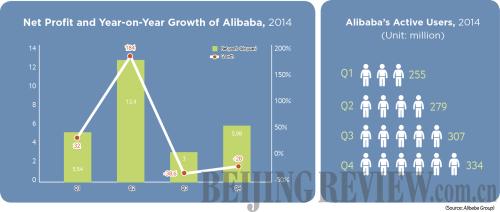
"As a third-party platform, Taobao has the obligation to combat fakes. But only doing that online is not enough, because even if fakes are cleared from Taobao.com, they can still be sold on other online platforms or in brick-and-mortar stores," Wang Chunhui said.
"If factories that produce fakes are not closed, the source of fake products will still exist and they will always find a way to reach customers," Wang Chunhui said. "Therefore, combating fakes online is a systematic project and industry regulators should bear the primary responsibility."
He Bing, Deputy Dean of the Law School of the Beijing-based China University of Political Science and Law, said Alibaba and the SAIC have a lot to work with hand in hand.
"Alibaba doesn't have the right to enforce the law, but it can report information about fake products being sold on its online marketplaces to law enforcement agencies, and the latter have to act swiftly after receiving tips," He said.

Alibaba-SAIC Dispute Blow by Blow
January 23
The SAIC's sample test showed that only 37.25 percent of surveyed commodities sold on Taobao.com were authentic, lower than a 58.7-percent average of major online shopping platforms and much lower than 90 percent for JD.com, and 85.71 percent for Tmall, a business-to-customer online marketplace of Alibaba.
January 27
Taobao accused the SAIC of unfair treatment over its random quality inspection by issuing a letter on its official Sina Weibo. Taobao questioned the poll's sampling method and its test standards, claiming that the regulator released the survey results to the public without giving Alibaba a chance to first appeal.
Later that day, the SAIC issued an immediate response, stressing that all of the activities they conducted were in line with the law.
January 28
The SAIC released a document called the White Paper on Administrative Guidelines for Alibaba to the public, accusing Alibaba of allowing illegal operations to flourish on its online shopping websites and urged the company's executives to overcome their arrogance.
Later that day, Taobao posted a response on its official microblog, saying the company will file a complaint against Liu Hongliang, Director of the SAIC's Department of Market Regulation, claiming that he drew inappropriate and non-objective conclusions after the investigation.
January 29
Three vendors on Alibaba's Tmall.com platform voiced strong protests against the SAIC report, saying their stores had been frozen by Tmall since the SAIC report and they had not received any report or evidence from the SAIC showing what they had done wrong. In an online statement, they pledged to use administrative litigation to protect their legitimate interests if the SAIC refuses to respond.
The stock price of Alibaba plunged 8.78 percent.
January 30
The two sides finally made peace when the head of China's commerce regulator met with Alibaba's Chairman Jack Ma to exchange opinions on joint efforts to fight the sale of fake products.
The SAIC said the white paper it released earlier is only a meeting minutes report and does not have legal validity.
The stock price of Alibaba decreased 4.36 percent.
Copyright ©1999-2018
Chinanews.com. All rights reserved.
Reproduction in whole or in part without permission is prohibited.